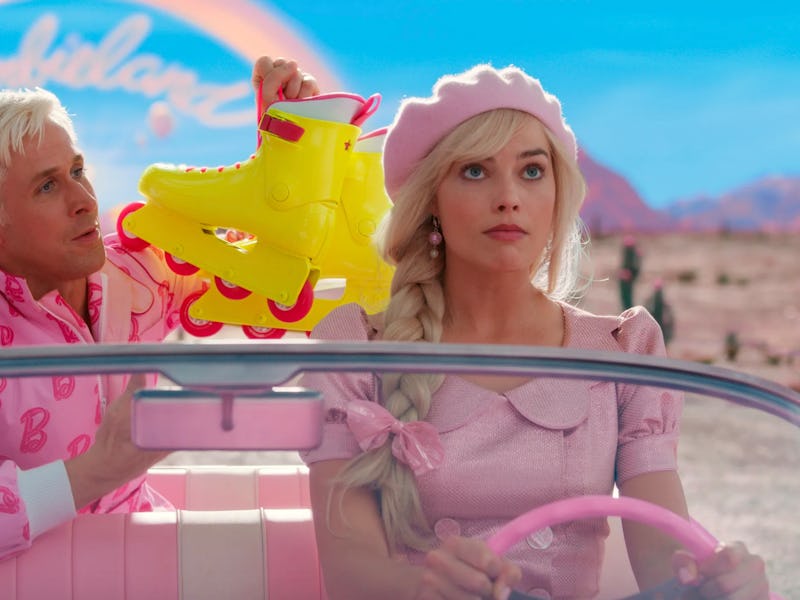Why Are So Many Movies About Brands Now?
Hollywood’s most concerning new trend is already gaining steam.

Two of the most anticipated movies of the year hit theaters this week: Christopher Nolan’s Oppenheimer and Greta Gerwig’s Barbie. The films themselves couldn’t be more tonally or narratively apart from each other, which is why their simultaneous release has become such a point of obsession online. In the case of Barbie, there’s no studio comedy this year that has had as much excitement behind it or promotion dedicated to it.
As distinct and purposefully weird as Barbie looks, though, the film itself is just the latest addition to one of this year’s most surprising trends. The film, which isn’t just co-produced by Mattel but was made under its executives’ reportedly intense supervision, is as much a piece of brand marketing as it is a playful new comedy written by Greta Gerwig and Noah Baumbach. It isn’t the first 2023 movie that has been made for and with a specific brand in mind, either.
Indeed, the “brand movie” is a growing genre in Hollywood, one that seems poised to potentially take the place of superhero and comic book movies as the dominant form of big-screen, IP storytelling in the coming years. As good and unique as Barbie looks, too, it’s worth not only noting its place in this startling new Hollywood wave but also pointing out the dangers that too many brand-centric films pose to the future of American moviemaking.
Flamin’ Hot’s account of the creation of Flamin’ Hot Cheetos has, to put it lightly, been heavily contested.
Throughout this year, audiences have been hit with a shockingly large number of brand-name, product-based movies. In March, Apple TV+’s Tetris explored the untold true story of its eponymous game’s Cold War-era creation and worldwide distribution, while Paramount Pictures tried to help Hasbro profit off one of its increasingly popular subsidiaries when it released Dungeons & Dragons: Honor Among Thieves. In the months since then, films like Air, BlackBerry, and Flamin’ Hot have all similarly explored the “true stories” behind some of the world’s biggest products.
To be clear: Not all of these films have been the same or even shared the same perspective. BlackBerry, for instance, turned out to be a Social Network-esque drama about how corporate greed took down one of the world’s biggest phone companies. As much as it was a piece of expensive marketing for its titular TTRPG, Dungeons & Dragons: Honor Among Thieves also proved to be one of the year’s funniest, smartest, and most subversive blockbusters. Stylistically and thematically, there isn’t much that binds Barbie, D&D: HAT, Air, BlackBerry , Flamin’ Hot, and Tetris together.
Air never lets you forget which company it’s promoting.
Hollywood’s increasing fascination with brand-name movies isn’t difficult to grasp. Brands like Barbie and Air Jordan are familiar to audiences, which means it’s easier to raise viewers’ awareness of movies about them than it’d be to generate interest in original, unfamiliar stories. With Barbie, Warner Bros. has also found a willing and eager production partner in Mattel, a company that reportedly has over 40 more movies based on its products in development right now, including a J.J. Abrams-backed Hot Wheels film. (This year’s Transformers: Rise of the Beasts, meanwhile, marked the beginning of Hasbro’s quest to create a new cinematic universe based on at least two of its biggest toy brands.)
With the exception of BlackBerry, though, one thing they all do is threaten to humanize brands and corporations that definitely don’t need or deserve to be. Air, Flamin’ Hot, and Tetris all turn tales of corporate success into underdog stories — making it easier for audiences to see companies like Nike, Nintendo, and Frito-Lay less as monolithic, soulless corporate entities and more like closely-knit communities. That’s a dangerous thing for any movie to do, especially during a time when consumers should be even more skeptical of the world’s biggest corporations than they’ve ever been before.
What happens when too many movies become the big-screen equivalent of a promotional tie-in toy?
Once upon a time, toys used to be commissioned in order to help movie studios promote their titles. This year, however, has marked a seemingly permanent change to that system. Now, it’s the movies that feel like promotional tie-in items. That might not feel like such an apocalyptic notion were it not for the fact that Hollywood has, for years now, been edging dangerously close to fully erasing the artistic edge that once made it a legitimately special industry.
If every movie is, in some way, tied back to an established company or brand, then where is the room for stories that dare to dream about life outside the confines of America’s already suffocating corporate structure?
In case the dangers of such unwaveringly corporate-minded thinking weren’t already clear enough, it’s worth noting that this piece was written during the current WGA and SAG-AFTRA strikes. As much as certain Hollywood CEOs would like you to believe otherwise, without the labor of the writers and actors currently on strike, the movies discussed here wouldn't exist — plain and simple.
Barbie is playing in theaters now.
This article was originally published on